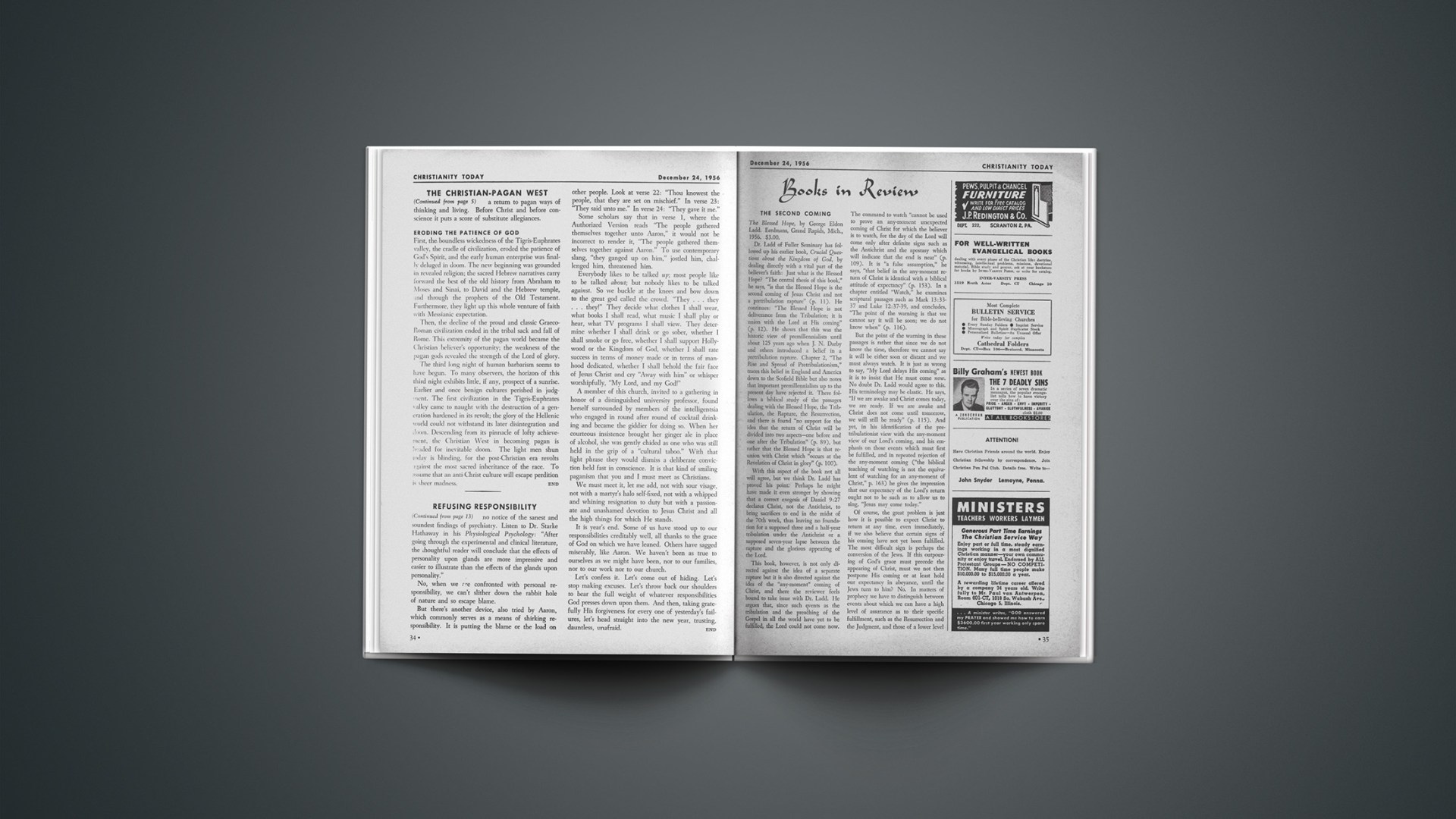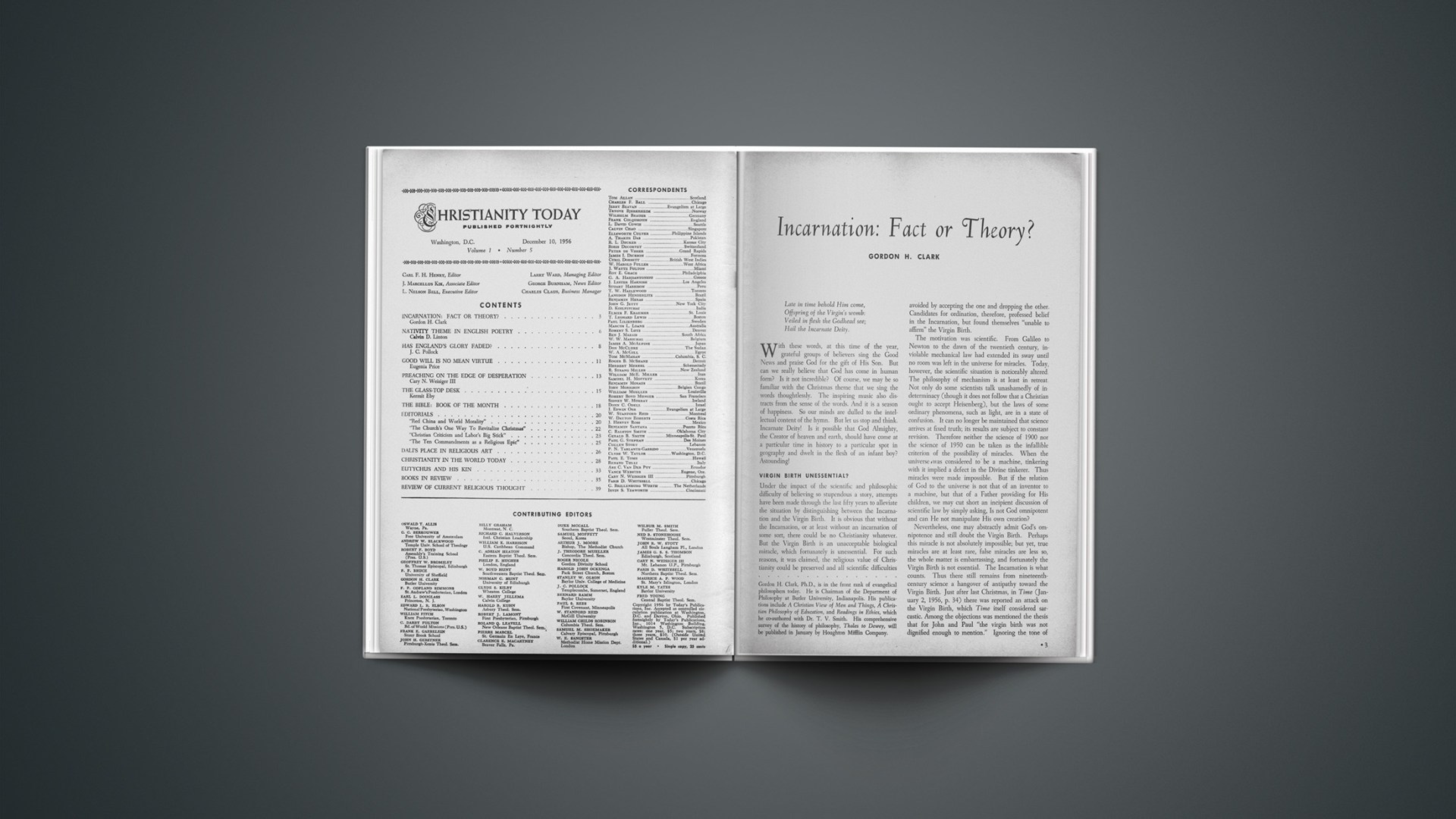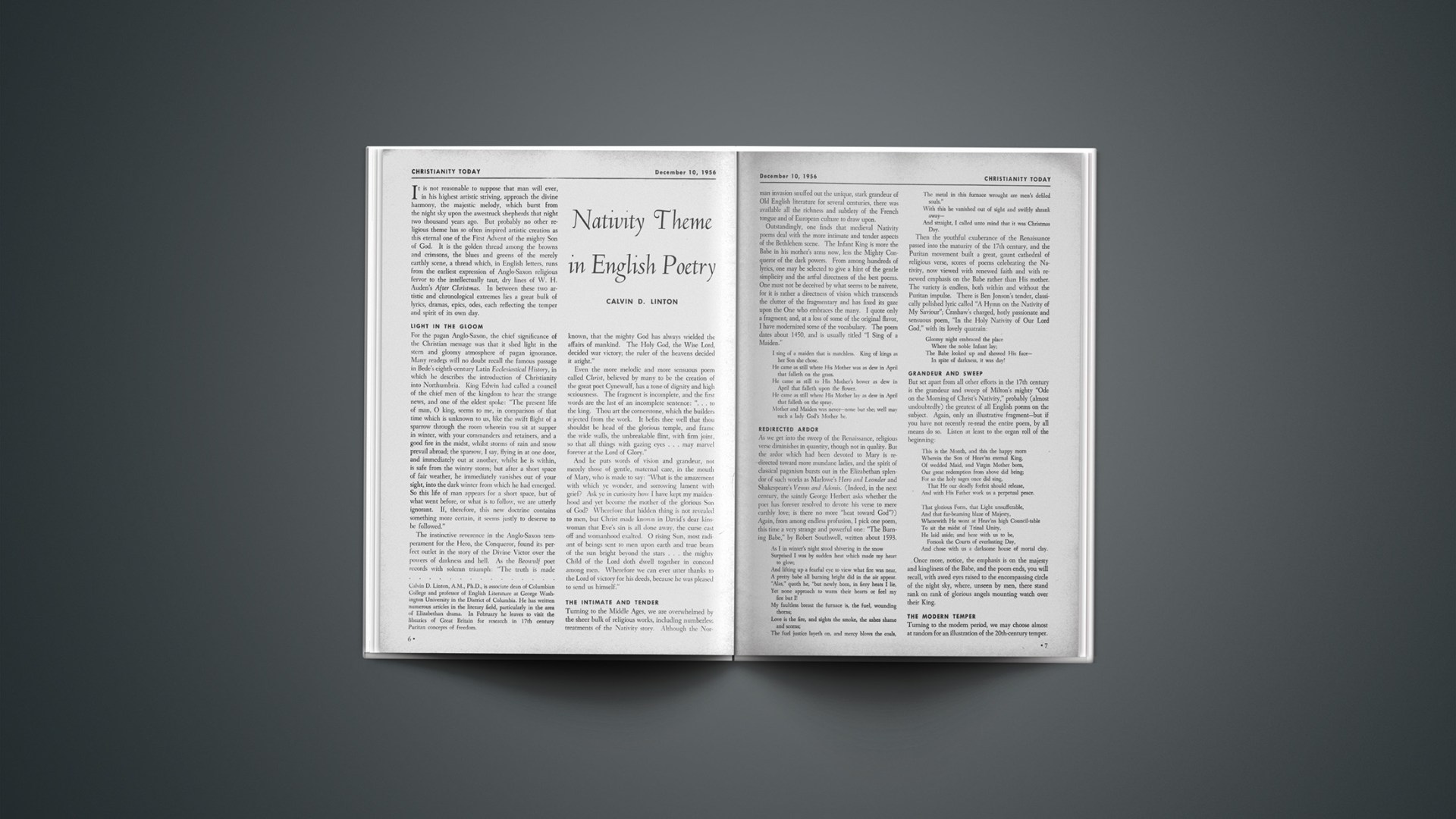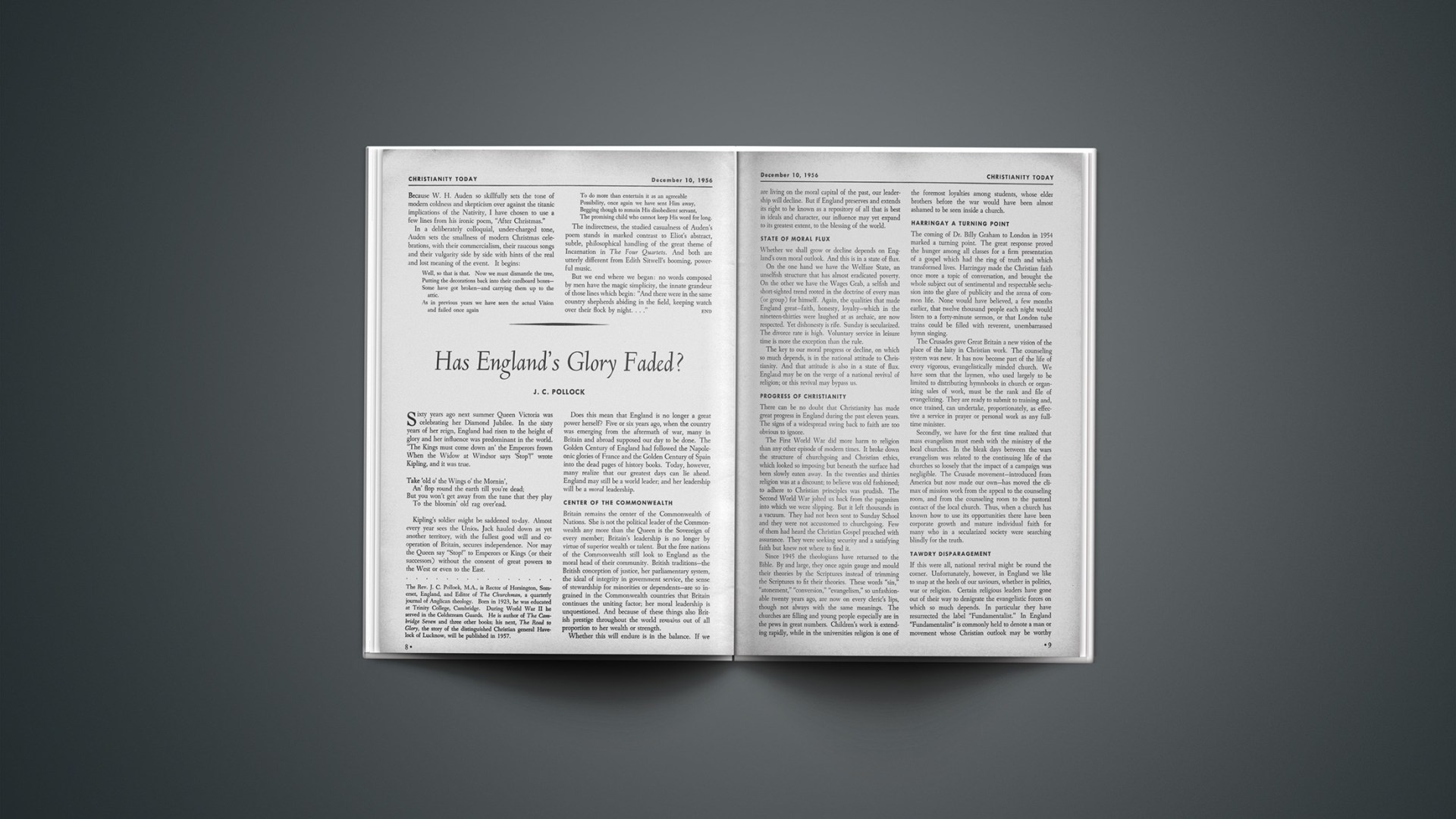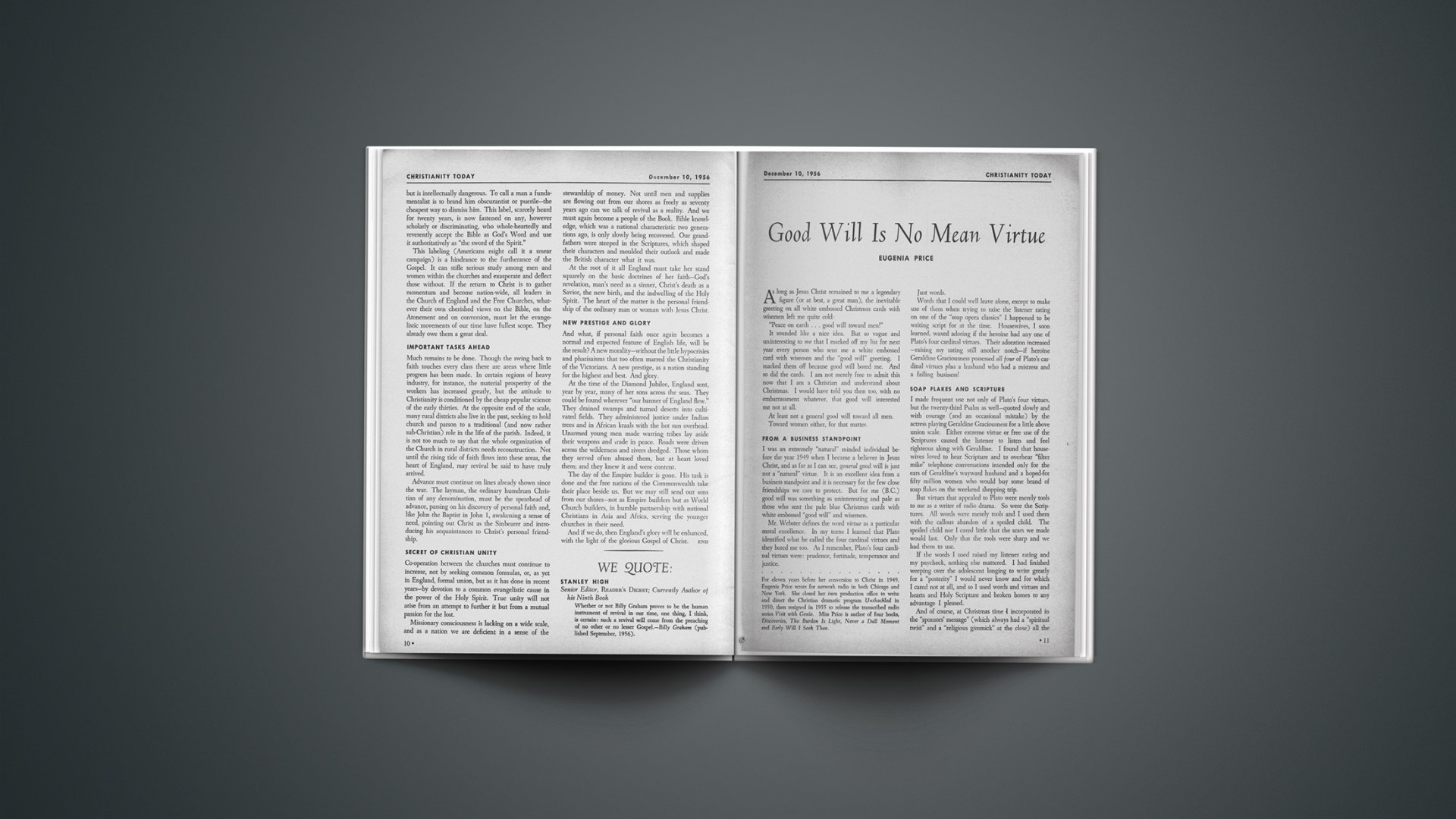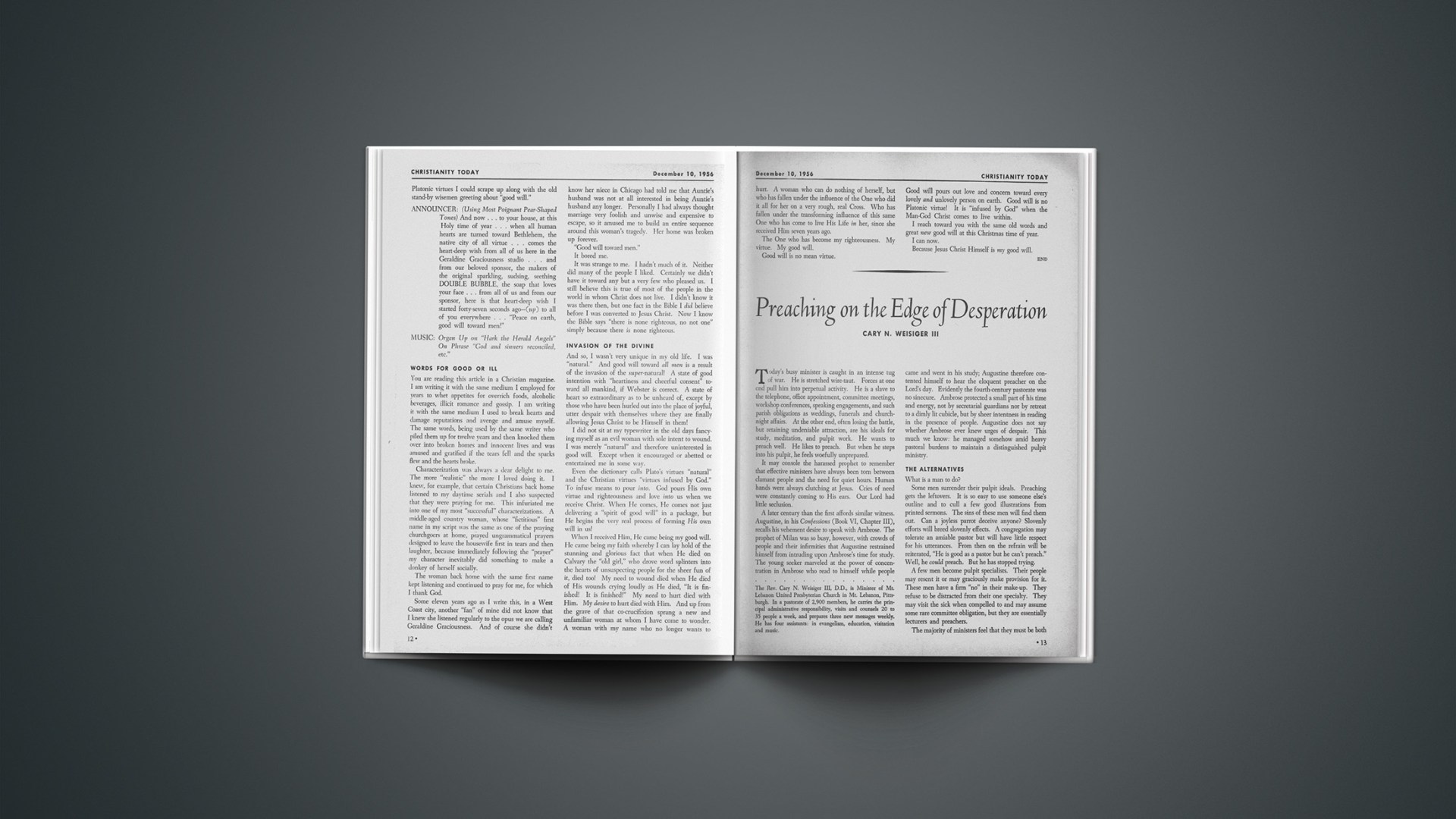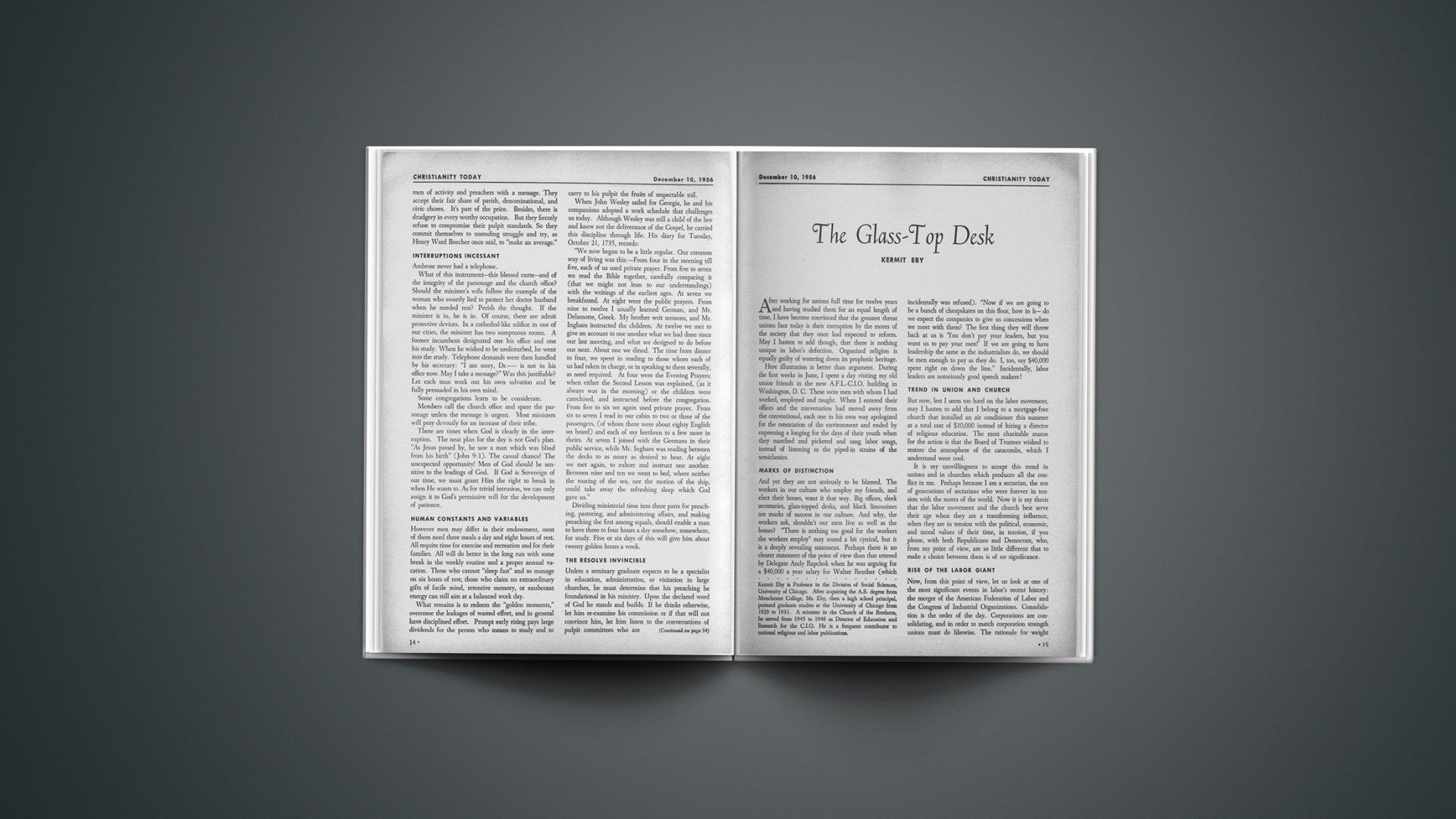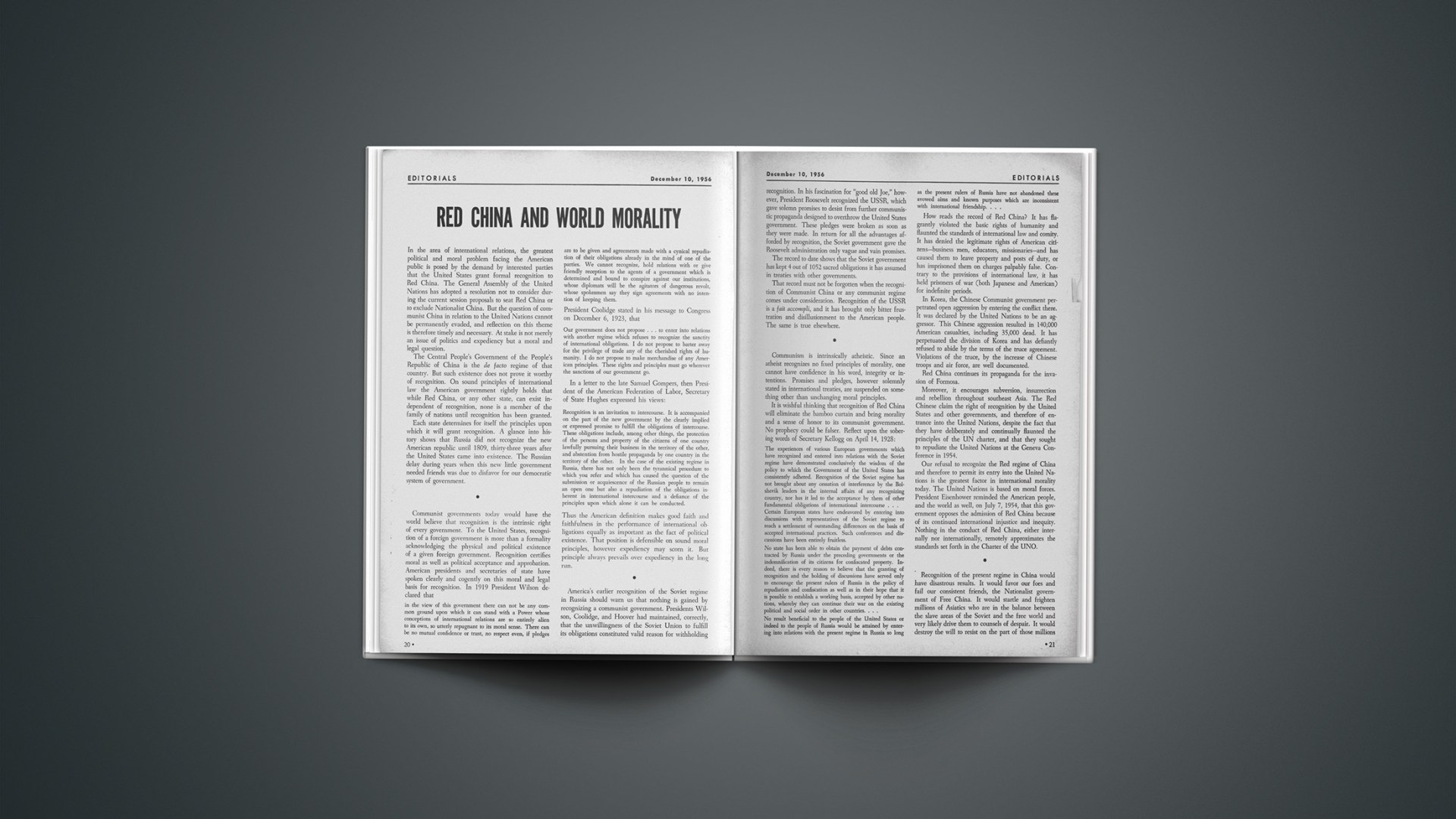The Second Coming
The Blessed Hope, by George Eldon Ladd. Eerdmans, Grand Rapids, Mich., 1956. $3.00.
Dr. Ladd of Fuller Seminary has followed up his earlier book, Crucial Questions about the Kingdom of God, by dealing directly with a vital part of the believer’s faith: Just what is the Blessed Hope? “The central thesis of this book,” he says, “is that the Blessed Hope is the second coming of Jesus Christ and not a pretribulation rapture” (p. 11). He continues: “The Blessed Hope is not deliverance from the Tribulation; it is union with the Lord at His coming” (p. 12). He shows that this was the historic view of premillennialists until about 125 years ago when J. N. Darby and others introduced a belief in a pretribulation rapture. Chapter 2, “The Rise and Spread of Pretribulationism,” traces this belief in England and America down to the Scofield Bible but also notes that important premillennialists up to the present day have rejected it. There follows a biblical study of the passages dealing with the Blessed Hope, the Tribulation, the Rapture, the Resurrection, and there is found “no support for the idea that the return of Christ will be divided into two aspects—one before and one after the Tribulation” (p. 89), but rather that the Blessed Hope is that reunion with Christ which “occurs at the Revelation of Christ in glory” (p. 100).
With this aspect of the book not all will agree, but we think Dr. Ladd has proved his point. Perhaps he might have made it even stronger by showing that a correct exegesis of Daniel 9:27 declares Christ, not the Antichrist, to bring sacrifices to end in the midst of the 70th week, thus leaving no foundation for a supposed three and a half-year tribulation under the Antichrist or a supposed seven-year lapse between the rapture and the glorious appearing of the Lord.
This book, however, is not only directed against the idea of a separate rapture but it is also directed against the idea of the “any-moment” coming of Christ, and there the reviewer feels bound to take issue with Dr. Ladd. He argues that, since such events as the tribulation and the preaching of the Gospel in all the world have yet to be fulfilled, the Lord could not come now. The command to watch “cannot be used to prove an any-moment unexpected coming of Christ for which the believer is to watch, for the day of the Lord will come only after definite signs such as the Antichrist and the apostasy which will indicate that the end is near” (p. 109). It is “a false assumption,” he says, “that belief in the any-moment return of Christ is identical with a biblical attitude of expectancy” (p. 153). In a chapter entitled “Watch,” he examines scriptural passages such as Mark 13:33–37 and Luke 12:37–39, and concludes, “The point of the warning is that we cannot say it will be soon; we do not know when” (p. 116).
But the point of the warning in these passages is rather that since we do not know the time, therefore we cannot say it will be either soon or distant and we must always watch. It is just as wrong to say, “My Lord delays His coming” as it is to insist that He must come now. No doubt Dr. Ladd would agree to this. His terminology may be elastic. He says, “If we are awake and Christ comes today, we are ready. If we are awake and Christ does not come until tomorrow, we will still be ready” (p. 115). And yet, in his identification of the pretribulationist view with the any-moment view of our Lord’s coming, and his emphasis on those events which must first be fulfilled, and in repeated rejection of the any-moment coming (“the biblical teaching of watching is not the equivalent of watching for an any-moment of Christ,” p. 163) he gives the impression that our expectancy of the Lord’s return ought not to be such as to allow us to sing, “Jesus may come today.”
Of course, the great problem is just how it is possible to expect Christ to return at any time, even immediately, if we also believe that certain signs of his coming have not yet been fulfilled. The most difficult sign is perhaps the conversion of the Jews. If this outpouring of God’s grace must precede the appearing of Christ, must we not then postpone His coming or at least hold our expectancy in abeyance, until the Jews turn to him? No. In matters of prophecy we have to distinguish between events about which we can have a high level of assurance as to their specific fulfillment, such as the Resurrection and the Judgment, and those of a lower level such as the exact nature of the millennium. And firmly on the higher level of assurance is the joyful duty of watching at every moment for the coming of Christ, for we are told again and again in the plainest language always to be ready because we know not at what hour the Lord will come. On a lower level of assurance are the signs: the salvation of the Jews, antichrist, tribulation. They may be fulfilled or may have been fulfilled in another way than we would expect.
To reject the separate, secret rapture is not to reject the any-moment coming. The any-moment glorious appearing of Christ, whether now, soon, or distant, is in the reviewer’s estimation the Blessed Hope.
ARTHUR W. KUSCHKE, JR.
Not Orthodox
The Theology of Reinhold Niebuhr, by Hans Hofmann. Scribner’s, New York, 1956. $3.95.
This is a painstaking and faithful interpretive summary of the theology of Reinhold Niebuhr, which traces its development from its earliest inception in his pastoral experiences in Detroit to its mature expression in The Nature and Destiny of Man and Faith and History. Hofmann uses a great number of quotations, often letting Niebuhr speak for himself.
Even though Niebuhr’s major works are readily accessible, a summarization is not out of place. An understanding of the background and development of Niebuhr’s thought is important, and this cannot be had by reading even his most systematic work. To get a rounded view without such an interpretive summary one would have to make a long and arduous study of a number of Niebuhr’s works.
Hofmann’s treatment is divided into four major sections: “The Beginning,” “Religion and Society,” “Sin as Man’s Severance of His Relatedness to God and Society,” and “Faith and Society as the Poles of the Original and True State of Man.” The treatment, therefore, revolves around the correlation of God, man, and society, in which man is the key link (pp. 91, 110). As Niebuhr sees it, the problem is not in God or in religion as such, nor is it in the external conditions of society. The problem lies first of all in man himself. Because of a disturbance of man’s relationship to God, his relation to society and society itself are disturbed (pp. 114, 236 et. al.).
The main source of difficulty is found in man as sinner (p. 113 f.). Hofmann believes that Niebuhr’s entire theology may be expounded around this theme. His book was originally published in Switzerland under the title, The Theology of Reinhold Niebuhr, in the Light of His Doctrine of Sin.
Sin is indeed a major theme in Niebuhr’s thought. In terms of it he has criticized some of the most cherished tenets of social and theological liberalism. But to look at Niebuhr’s position from the biblical point of view is to rejoice on the one hand that he recognizes sin at all and especially that he sees the spiritual nature of sin; and yet it is to regret on the other hand that he refuses to recognize, e.g., an actual pre-fall state and an historical fall. Looking at man here and now, Niebuhr says, without any concern for his historical origin or development, what tools do we need to interpret his present condition? The answer is that we need certain myths that have come to us in the Christian tradition: e.g., the fall and original sin. The Christian doctrines are myths, supra-scientific, imaginative expressions which must be taken seriously but not literally, which God has used for his revelation of himself and of the state of man. As with the other doctrines of the Christian faith, we have in Niebuhr’s view of sin a basic reconstruction of the biblical position.
The question of myth has been widely discussed lately, and the controversy is by no means closed. Very interesting is Hofmann’s comparison of the position of Niebuhr and Rudolf Bultmann, who is famous for his program of demythologization (p. 75 ff.). Niebuhr sees the supposed myths in the Scriptures as indispensable vehicles of divine revelation, while Bultmann finds the essential thing in the existential meaning underneath the form of mythical speech. But it is clear that Niebuhr is as radical as Bultmann in relegating biblical material to the realm of myth (cf. p. 92 f.). For both men such doctrines as the original sinless state, the fall, the preexistence of Christ, the doctrine of the two natures of Christ, the ascension, the session on God’s right hand, and His coming again in glory are myths and cannot be taken literally in any sense. Observing closely one sees that the current fray is a variation on the theme of supernaturalism versus anti-supernaturalism. Whatever remnants of supernaturalism might remain in Niebuhr (as Tillich claims), he is quite solidly anti-supernaturalistic.
With this in mind, it is noteworthy that Hofmann’s book is almost entirely free of criticism. In addition, we note that Hofmann has not fully laid bare the change of meaning that standard theological terms have undergone in Niebuhr’s thought. I would judge that while Hofmann has been faithful in his presentation, he has pictured Niebuhr as somewhat too orthodox, just because he has not always let Niebuhr’s terms be seen in their changed meaning. Niebuhr’s theology is indeed a modification of liberalism, but it is in no instance a return to orthodoxy.
ROBERT D. KNUDSEN
Wisdom Of Prophets
The Parables of the Old Testament, by Clarence E. Macartney. Baker, Grand Rapids Michigan. $2.00.
There is an abundance of material on the parables of the New Testament, but very little that deals with the parables of the Old Testament. In his research preparatory to the writing of this volume, Dr. Macartney discovered that neither in America nor in Great Britain could he find a single book that dealt with the parables of the Old Testament. In the preparation of this volume, therefore, he described his feeling as being similar to the experience of the men of the sixteenth century who sailed upon seas that never before had been cleft by the keel of a ship.
Dr. Macartney finds that the principal difference between the parables of Christ and those of the Old Testament consists in the fact that nearly all of the parables of our Lord taught spiritual truth that is timeless, whereas the parables of the Old Testament were messages for a special occasion. Despite this fact, the author maintains that the parables of the Old Testament teem with suggestions of truth, which are relevant for any age, and in many instances they may be made the vehicle of evangelical truth.
Included in this volume are two fables, the only ones in the Bible, that of the Trees and that of the Thistle and Cedar. The general purpose of the fable and parable is the same, said Dr. Macartney, to illustrate moral and spiritual truth by comparison with what actually transpires. But the fable differs from the parable in that in the fable the subjects of the mineral or vegetable or animal kingdom “feign to speak and act with human interest and passion.”
The content of this volume will provide biblical material that will be new and fresh to most congregations.
The nine chapters in this volume, as Dr. Macartney expresses it, represent the garnered wisdom of prophets, chroniclers, and seers, some of them known and some of them unknown, but all worthy of a better acquaintance.
Dr. Macartney has written scores of volumes, but it is doubtful if any contains the marked originality, vivid description and powerful presentation equal to this work produced in his earlier ministry and reprinted for readers of today.
JOHN R. RICHARDSON
Typology?
Devotional Studies of Old Testament Types, by Fred H. Wight. Moody, Chicago, 1956. $3.50.
Perhaps no area of biblical interpretation has suffered more acutely at the hands of the higher critics than Old Testament typology. The reviewer once sat under a seminary professor who hurled the typical approach wholesale to the rubbish heap of antiquated imaginations. Wight justifies the method by appealing to Jesus’ and Paul’s use of it, an observation that ought to silence all objections.
Discreetly the author, a Baptist minister, in his introduction first defines a type as “a person, thing or event in the Old Testament designed (underlining my own) to represent or prefigure some person, thing or event in the New Testament.” It is regrettable that his presentation of the subject in many instances repudiates that definition by confusing and equating analogies with types. We could illustrate at length for the examples are numerous, but several will suffice. All are taken from the chapter on I and II Samuel: “The Kingdom of Saul, a Type of the Self-Life”; “David at the Cave of Adullam, a Type of Christ Our Captain”; “Bringing the Ark to Jerusalem, a Type of Revival in the Church”; and “Mephibosheth, The Type of a Sinner Saved by Grace.” Parallels of this kind may be drawn by analogy, but they certainly do not belong to typology. Incidentally, this mode of exposition is largely responsible for bringing typology as such into disrepute.
Wight is at his best when he deals with characters who prefigure Christ, like Joseph and Moses, studies of interest and value. Elsewhere, however, he tends, even within the bounds of legitimate typology, to fanciful and exaggerated conclusions which bear reminiscences of Origen’s allegorical interpretation of the Old Testament and Augustine’s comments on the parables. This of course critically weakens the historical impact. He further forces certain features into his dispensational eschatology.
The book exhibits a tendency to needless repetition, at times a lack of correlation of points and occasional deceptive literalisms. Though solidly evangelical and loyal to the Scriptures as the fully-inspired Word of God, it is difficult to recommend this volume. It will confuse and mislead the theologically unoriented and prove too much of a surface study for preachers who will want to stretch their mental muscles with works like those of Fairbairn, Habershon and Baron.
RICHARD ALLEN BODEY
Perfumed, Beribboned
The Old Story of Salvation, by Sophia Lyon Fahs. Starr King and Beacon, Boston. $3.00.
It is evidently the author’s purpose in this book to retell the Story in the Bible (she would distinguish this from the story of the Bible) as a living narrative which may be found woven through the largely extraneous material from Genesis to Revelation; and then to discuss the meaning and significance of that story for the purposes of modern, liberal religion. The book is in two parts. The first is the aforementioned historical narrative and is a very fine, condensed Bible Story which includes, uncritically, the traditional theophanies, miracles, the Virgin Birth, the Resurrection, etc., to the end of the Revelation. The second part, which is the meat of the author’s writing is called “The Unanswered Question: ‘What is Truth?’ ” In this last 40% of the book, she offers her opinions on the religion which she believes may be found, not by mutilating the story, but by understanding it as a myth and fable. The result is a perfumed and beribboned Hegelian idealism in modern dress. Except that not even Hegel would have taken such liberties with traditional religious concepts.
The author, who has no evident use for orthodoxy, whether traditional or “new,” identifies herself with the Council of Liberal Churches. She explains, in a burst of confidence, that she developed her ideas while working with the boys and girls in the Church School of the Riverside Church of New York City.
One of the milder views she elaborates in the discussion section is the now familiar one, that the “original” Christian faith was “not what Jesus believed, but what the Christian church early came to believe about Jesus.” And the author believes that her’s is “not a study of history directly, but rather of a great tradition which has molded history.”
She feels that it is “crude reasoning” to present the death of Christ as an atonement. He died, essentially for the same reason that Socrates and Ghandi died, an ideal person going down in defeat, despised, rejected, his cause apparently lost. Moreover, Jesus never thought of himself as a Messiah, never sent out disciples to preach and baptize in His name, never would have claimed to be the only savior among the world’s saviors. One’s heart goes out to those boys and girls at the Riverside Church.
G. AIKEN TAYLOR
Popular Biography
By Faith Alone, by W. J. Kooiman. Philosophical, New York, 1955. $6.00.
It is not necessary for any reviewer to tell evangelical Christians how valuable Dr. Martin Luther, whose biography is ably and attractively presented in this excellent book, is for our present-day evangelical believers who adhere to salvation by faith in Christ without works. But there may be a need to introduce the readers to Professor Kooiman of the University of Amsterdam since he may not as yet be known to many evangelical Christians in America. To say it briefly, he is instructor of church history in the University of Amsterdam and is a most influential preacher and radio speaker in the Netherlands, whose interest in Luther is deep and inspiring. Believing that evangelical Christendom must hold to the doctrine of God’s free grace in Christ Jesus, he proclaims this precious doctrine with a conviction that stirs and enlivens those who listen to him. His Life of Martin Luther was written as a pastor who keeps in mind his parishioners, both young and old. In 1954 the reviewer read it in Holland in the original. Later, he read it in a German translation, and now he has read it in an English translation by Dr. Bertram Lee Woolf which is so masterfully done that no fault can be found with it. Dr. Kooiman’s biography of Luther is not scientific in the strict sense of the term, but rather is popular. Yet in accuracy, depth, and comprehensiveness, so far as Luther’s life and work are concerned, it is truly scientific within its scope. The reviewer recommends Kooiman’s By Faith Alone to all evangelical Christians and hopes that it will become as popular in the English-speaking countries as in the Netherlands and Germany.
JOHN THEODORE MUELLER

